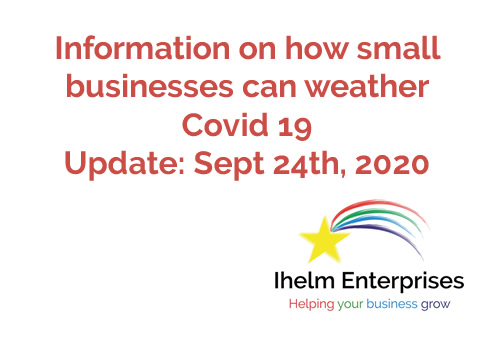Earlier today the Chancellor addressed the MPs in the Commons to discuss further help that is going to be given to businesses to help them get through the current economic crisis and support jobs. I will try my very best to explain things as clearly and concisely as I can. Like with the other measures that were brought in, I expect further details will continue to be released over the coming weeks and I will make sure I provide any updates as and when they are released.
1) Job Support Scheme (JSS)
The furlough scheme will end on October 31st, 2020, however, from November 1st, a new scheme – the Job Support Scheme – will be in place for a period of 6 months. This scheme will allow workers who are working for at least 1/3 of their normal hours, to receive full pay for the hours they work, plus 1/3 of the wage for the hours not worked from the government and 1/3 of the wage for the hours not worked from the employer. The government will cap the amount they fund at 22% (or £697.92/month). It is open to all small- and medium-sized businesses who have a UK bank account and a UK PAYE scheme, and larger businesses can use the scheme only if they can show they have been adversely affected by covid-19. If a large business uses the scheme, they will not be able to make any capital distributions (dividend payments) while using the scheme. Employees can be moved on and off the scheme and work different hours, but the scheme must cover a 7-day working pattern. In order for an employer to use the scheme for an employee, they must have been on the payroll since at least 23/09/2020. Any employee who is on the JSS cannot be made redundant or put on notice. It is not restricted to employers who used the furlough scheme – even if an employer didn’t access the furlough scheme, they can use the JSS. It also does not affect an employer claiming the Job Retention Bonus. Employers will be reimbursed for the costs by the government after the work has been done and the employee has been paid.
2) Self-Employed Income Support Scheme (SEISS)
The SEISS will be extended for a further 6 months.
There will be two different taxable grants – the first one will cover 20% of the average monthly trading profits for a three-month period starting in November. The amount will be paid out in one single payment covering the 3 months and be for a total of up to £1875.00. The same eligibility criteria that have been used for the other two SEISS grants will still apply.
The second taxable grant will be from February 2021 to April 2021 but they haven’t yet said what the amount will be. They will be reviewing this and releasing the information later.
3) “Pay as You Grow” Scheme
Any business that took out a government-guaranteed loan (BBLS) will be able to have the payment terms extended from 6 years to 10 years allowing businesses to have lower monthly repayments. A business can move to interest-only payments (which they can use up to 3 times) or suspend payments if they are in real trouble for up to 6 months (which they can only do once and only after they have made 6 payments). The government has said that this will not affect someone’s credit rating. Any business that took out a Coronavirus Business Interruption Loan will also have their payment terms extended to be over 10 years.
The application for any of the four loans the government announced (BBLS/CBILS/CLBILS/Future Fund) has also been extended to November 30th, 2020.
The Chancellor has stated that a new loan scheme will be available in January, but they haven’t released any further details at this time.
4) VAT Deferral
The businesses that deferred their VAT payments that were due between March and June 2020, will not have to pay a lump sum at the end of March 2021, instead, they will be able to split the payments into smaller, interest-free payments over a period of 11 months, meaning the payments will be more manageable. A business will need to opt-in to take advantage of this new payment scheme and the opt-in process will be put in place by HMRC in early 2021.
5) VAT Reduction for Hospitality and Tourism Sector
The reduction of VAT from 20% to 5% for the hospitality and tourism sector was supposed to increase back to the normal VAT rate in January 2021, however, this will now not happen until March 31st, 2021.
6) Self-Assessment Income Tax Payments
Self-employed people who have tax payments due in January 2021 will be able to pay the amounts due over a longer period of time. If the tax debt is up to £30,000, people can go online and set up a 12-month payment plan to January 2022. If the tax debt is over £30,000, people will need to ring HMRC to set up a payment plan.
You can read the latest information here about the announcements made today: https://www.gov.uk/government/news/coronavirus-covid-19-what-has-changed-22-september
I am continually monitoring the updates that the government and other business-related departments release and will continue to share that information for as long as I feel that it is beneficial to all businesses in the UK.
The information and policies are continually being updated by the government, so I urge you to keep on top of the information by visiting the relevant website for your area.
UK: https://www.gov.uk/government/publications/guidance-to-employers-and-businesses-about-covid-19/covid-19-support-for-businesses
Scotland: https://www.gov.scot/coronavirus-covid-19/
Wales: https://gov.wales/business-and-employers-coronavirus
Northern Ireland: https://www.nibusinessinfo.co.uk/
I will be trying to keep myself as informed as possible and will share relevant information on my fb business page: https://www.facebook.com/ihelmenterprises/

